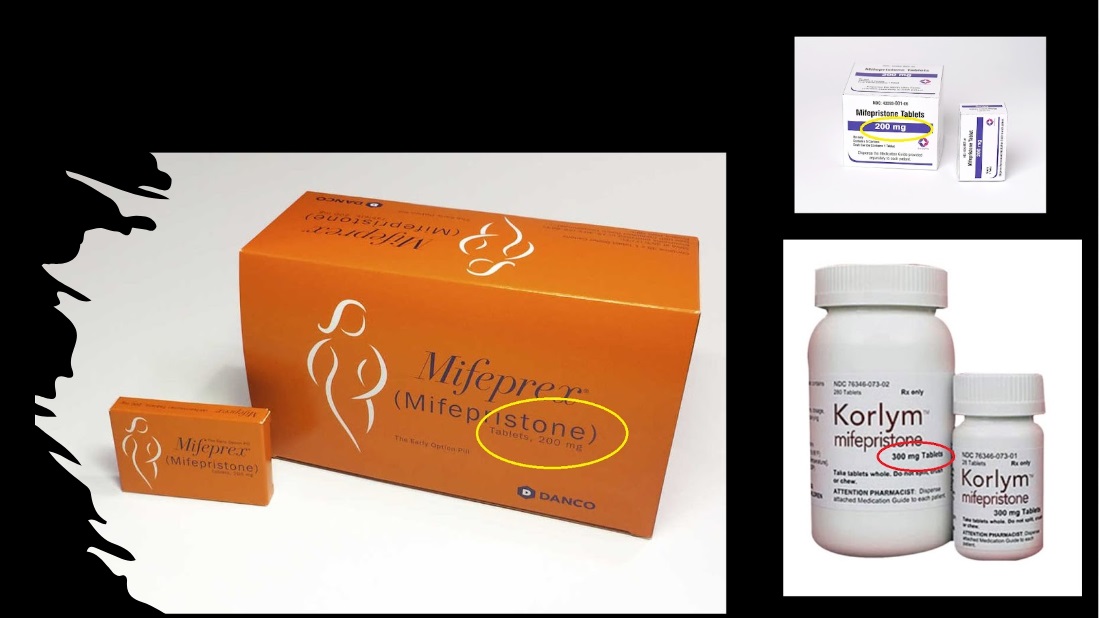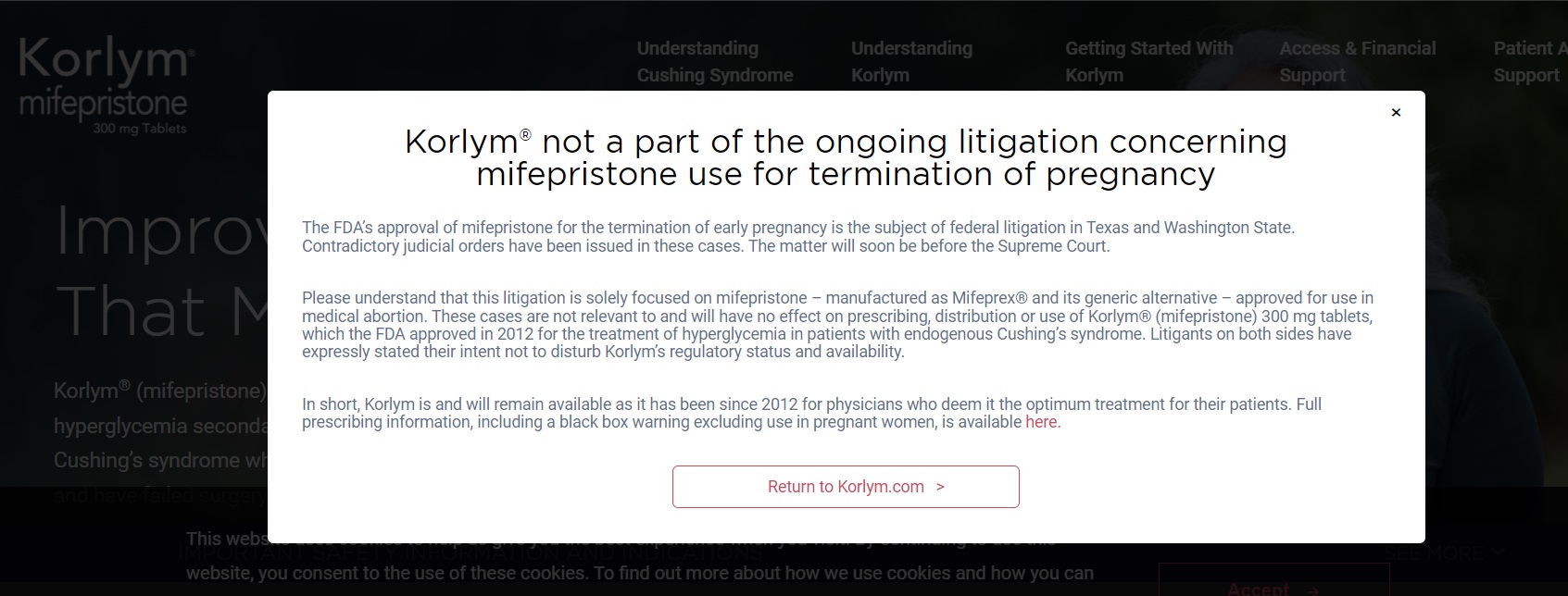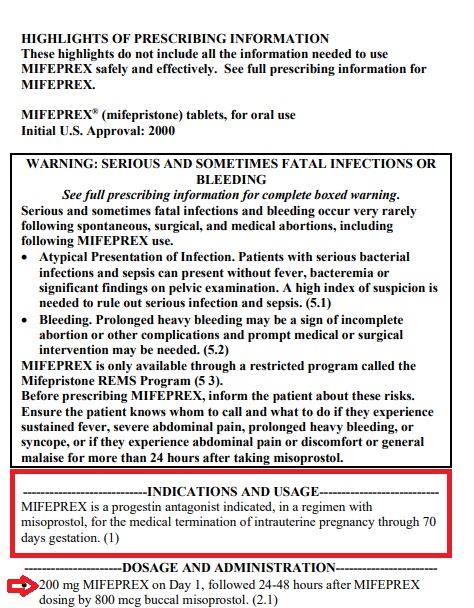Abortion proponents claim that if access to the abortion pill (mifepristone) is limited, women who suffer from a miscarriage or from Cushing syndrome will be negatively impacted. But is this true?
Mifepristone is the active ingredient used in both the abortion pill (brand name Mifeprex) and a separate drug called Korlym, which treats Cushing syndrome. But while both drugs contain the same active ingredient, they have different dosages, different U.S. Food and Drug Administration (FDA) approvals, different uses, and different manufacturers.
Since the Supreme Court overturned the Roe v. Wade decision in the Dobbs v. Jackson Women’s Health Organization ruling in June 2022, state lawmakers have moved to restrict the abortion pill and prohibit the mailing of the drug. In addition, litigation challenging the 2000 FDA approval of mifepristone for abortion is ongoing and will soon to be heard by the Fifth Circuit Court of Appeals, causing concerns that the drug could be made unavailable.

Mifepristone Mifeprex (200 mg) and GenbioPro generic abortion pill versus Korlym (mifepristone 300 mg)
What drug treats Cushing syndrome?
Korlym, manufactured by Corcept Therapeutics, was approved in 2012 by the FDA to treat Cushing syndrome. It contains mifepristone as the active ingredient. According to the FDA’s approval letter, Korlym’s mifepristone tablets are 300 milligrams versus the mifepristone approved by the FDA for the termination of pregnancy (abortion), which is 200 milligrams.
Korlym’s November 2019 black box label warns, “Mifepristone has potent antiprogestational effects and will result in the termination of pregnancy. Pregnancy must therefore be excluded before the initiation of treatment with KORLYM, or if treatment is interrupted for more than 14 days in females of reproductive potential.”
What drug is known as the abortion pill?
The abortion pill was approved in 2000 as mifepristone (brand name Mifeprex) and is administered in a 200-milligram dosage. It is manufactured under the direction of Danco Laboratories and the generic version under GenBioPro.
“The FDA first approved Mifeprex (mifepristone) in September 2000 for medical termination of pregnancy,” the FDA website states. “FDA approved a generic version of Mifeprex, Mifepristone Tablets, 200 mg, in April 2019.”
“Mifepristone is a drug that blocks a hormone called progesterone that is needed for a pregnancy to continue. Mifepristone, when used together with another medicine called misoprostol, is used to end a pregnancy through ten weeks gestation (70 days or less since the first day of the last menstrual period),” the FDA explains.
Cushing syndrome confusion
Illinois Pharmacy Association Executive Board President Carrie Wiggins recently claimed during a city council meeting regarding a ‘Sanctuary City for the Unborn’ ordinance in Danville, Illinois, that prohibiting the mailing of the abortion pill would “hurt those with Cushing’s syndrome.”
But a pop-up message on the website for Korlym, the drug approved for Cushing disease, contradicts her claim.
The company’s statement regarding Korlym reads, “The FDA’s approval of mifepristone for the termination of early pregnancy is the subject of federal litigation in Texas and Washington State. Contradictory judicial orders have been issued in these cases. The matter will soon be before the Supreme Court.”
“Please understand that this litigation is solely focused on mifepristone – manufactured as Mifeprex® and its generic alternative – approved for use in medical abortion. These cases are not relevant to and will have no effect on prescribing, distribution or use of Korlym® (mifepristone) 300 mg tablets, which the FDA approved in 2012 for the treatment of hyperglycemia in patients with endogenous Cushing’s syndrome. Litigants on both sides have expressly stated their intent not to disturb Korlym’s regulatory status and availability,” Korlym’s manufacturer added. “In short, Korlym is and will remain available as it has been since 2012 for physicians who deem it the optimum treatment for their patients. Full prescribing information, including a black box warning excluding use in pregnant women, is available here.”

Korlym not part of litigation on abortion pill
The abortion pill has never been approved for miscarriage
Despite claims, the abortion pill is not approved for use in miscarriage. However, any FDA-approved drug can be used off-label for purposes other than that for which it is approved. So while mifepristone (200mg) has been approved by the FDA for abortion use, the drug has not been approved by the FDA for miscarriage care.
In fact, under the category indications and usage on the mifepristone (200mg) label (updated in March of 2023), located just under the black box warning, it states, “MIFEPREX is a progestin antagonist indicated, in a regimen with misoprostol, for the medical termination of intrauterine pregnancy through 70 days gestation.” (emphasis added)

Abortion pill Mifepristone drug label 2023 indication and usage and black box warning
According to Johns Hopkins, medical management of a miscarriage involves the use of the drug misoprostol. It states, “This is treatment with medicines to help the pregnancy tissues pass. You may get a medicine called misoprostol. It makes the uterus contract and push out the pregnancy tissues.”
While misoprostol was approved to be used in the abortion pill regimen, it is not the abortion pill and does not actively work to kill a living preborn child as mifepristone does.
How do clinicians obtain the abortion pill?
Mifepristone (200mg) was placed under a safety system known as Risk Evaluation and Mitigation Strategy (REMS), which according to the FDA, is a “drug safety program that the U.S. Food and Drug Administration (FDA) can require for certain medications with serious safety concerns to help ensure the benefits of the medication outweigh its risks.”
REMS limits prescribers to only those approved by the “sponsors” of the drugs — Danco or GenBioPro. The abortion industry has been attempting to get the drug removed from under the REMS so it can sell abortion pills to anyone and expand abortion access in the process.
Currently, under the abortion pill’s REMS safety requirement, to become certified, prescribers must have the ability to accurately assess the duration of a pregnancy and diagnose an ectopic pregnancy. The REMS safety regulations require providers to sign the manufacturer’s prescribers agreement and up until recently, they also had to stock the drug, since it was not dispensed in a pharmacy. But that requirement changed in 2023 when the Biden FDA approved the dispensing of the abortion pill through retail pharmacies with a prescription.
Are OBGYNs prescribing mifepristone for miscarriage?
While the number of prescribers approved by Danco or GenBioPro is unknown, past studies have shown that a majority of OBGYNs were not certified to prescribe the drug, indicating that the majority of OBGYNs would be unlikely to prescribe mifepristone for miscarriage care.
Dr. Ingrid Skop, Vice President and Director of Medical Affairs for the Charlotte Lozier Institute, told Live Action News, “An FDA Risk Evaluation and Mitigation Strategy requires a provider to be registered to prescribe mifepristone, so it is not widely available, because few ob/gyns perform elective abortions. Thus, although there is limited data indicating that the addition of mifepristone may improve the efficacy of misoprostol in completing tissue evacuation during a miscarriage, it is not often used clinically.”
“Additionally,” Dr. Skop added, “because mifepristone is associated with excessive bleeding due to its direct effects on the uterine spiral arterioles, the few studies available are insufficiently powered to rule out excessive complications following mifepristone and misoprostol for miscarriage management compared to misoprostol alone.”
Yet, some OBGYNs have claimed that they do prescribe the abortion pill regimen of mifepristone and misoprostol for patients experiencing a natural miscarriage.
ABC News recently cited Dr. Kristyn Brandi as saying, “I offer it to every single patient whose miscarriage I manage. There will be a big impact if I am no longer able to use that medication.” The media outlet described Brandi as “an OB-GYN in Newark, New Jersey” but ABC News failed to disclose that Brandi also commits abortions and would most likely already be prescribing the drug to those clients as a certified prescriber under the REMS.
That same ABC News report suggested that since the abortion pill’s approval is being challenged in court, “they’re making backup plans for miscarriage care. One involves using only misoprostol to manage miscarriages. While it’s safe, research shows it’s not as effective at helping expel pregnancy tissue — which can lead to a dangerous infection if it stays in the uterus.”
Yet, abortion industry insiders recently pivoted to a one-drug regimen of misoprostol only. And many are now claiming that misoprostol’s efficacy is comparable to the two-drug regimen.
“In settings with limited access to these essential supplies and conditions, the use of misoprostol for uterine evacuation is an attractive alternative,” Gynuity Health Projects (GHP) claimed.
The pro-abortion group IBIS Reproductive Health, which was directly funded by abortion pill manufacturer Danco Laboratories and which is currently funded by abortion pill investor the Packard Foundation, writes, “Studies of self-managed use of misoprostol-alone regimens have found high levels of effectiveness, with 93-99% of participants reporting complete abortions without the need for surgical intervention.”
So, if the efficacy rate of misoprostol for early pregnancy loss is as high as the industry now claims it is, why are abortion proponents suggesting that restricting mifepristone would impact women who experience a natural miscarriage?
They cannot have it both ways.








